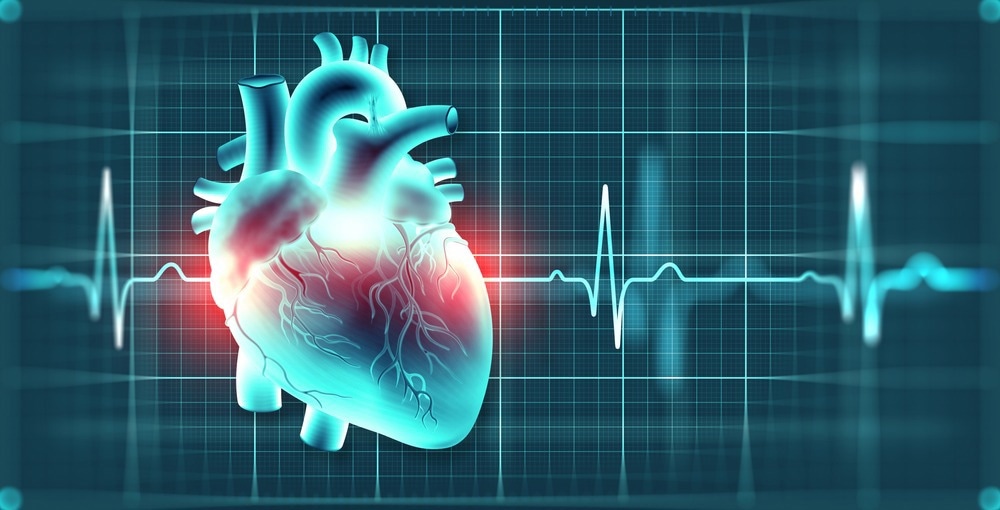To date, the severe acute respiratory syndrome coronavirus 2 (SARS-CoV-2), which is the virus responsible for the coronavirus disease 2019 (COVID-19), has infected over 603 million individuals and claimed more than 6.4 million lives worldwide.
About 30% of COVID-19 survivors continue to experience a wide range of persistent symptoms for several weeks since their initial diagnosis. This condition is commonly referred to as post-acute sequelae of SARS-CoV-2 infection (PASC) or “long COVID.”

Study: COVID-19 severity and risk of subsequent cardiovascular events. Image Credit: Yurchanka Siarhei / Shutterstock.com
Background
Even though multisystem inflammatory syndrome is the most common PASC syndrome in adults and children, a wide range of other symptoms, including sleep difficulties, persistent fatigue, type 1 diabetes, and neurological disorders, have been reported. The incidence of these symptoms varies from one person to another based on their demographic and clinical characteristics.
Several studies have indicated the manifestation of multiple cardiovascular complications, such as arrhythmia, hypertension, acute myocardial infarction, thromboembolism, and cerebrovascular accidents, in individuals who have recovered from COVID-19. However, a limited number of studies have confirmed that severe COVID-19 leads to a high risk of cardiovascular diseases.
A recent Clinical Infectious Diseases journal study determines the relationship between COVID-19 severity and risk of subsequent cardiovascular events (CVEs) in a large cohort.
Study findings
A retrospective cohort study was performed using nationwide health insurance claims data of adults from the United States Health Verity Real-Time Insights and Evidence database. Increased COVID-19 severity was found to enhance the risk of developing subsequent CVEs among individuals without a cardiac history in previous years.
As compared to COVID-19 patients who required outpatient care, those who required hospital admission were more likely to experience CVEs. Among COVID-19 hospitalized patients, those admitted to the intensive care unit (ICU) were almost 80% more likely to develop CVEs than non-ICU hospitalized patients.
In fact, non-ICU hospitalized patients exhibited only a 28% possibility of experiencing CVEs thirty days after initial COVID-19 symptoms. Additionally, as compared to COVID-19 outpatients, hospitalized patients were more likely to be admitted for a CVE after recovering from COVID-19.
In younger adults, the incidence of cardiovascular sequelae was lower as compared to older adults. Aside from CVEs, other severe outcomes, such as thrombotic events and cerebrovascular accidents, were observed in patients who recovered from severe COVID-19. However, such observations were less likely in COVID-19 patients who required only outpatient care.
The study findings emphasize the importance of vaccination, as demonstrated by its ability to reduce severe disease. Similarly, prompt antiviral treatment of acute COVID-19 has been recommended, which would help reduce the possibility of transition to severe illness.
Both COVID-19 vaccination and timely therapeutic interventions would alleviate the risk of severe COVID-19 and subsequently decrease the possibility of experiencing CVEs.
The findings of the present study are consistent with previous research that has reported a higher incidence of myocarditis and pericarditis in patients who recovered from severe SARS-CoV-2 infection. Nevertheless, it was observed that elevated cardiovascular risk after acute infection may not be exclusive to COVID-19.
In fact, some other diseases that have been associated with an increased risk of long-term CVEs are influenza and pneumonia bacteremia. Additionally, 22-65% of sepsis survivors are at an increased risk of CVEs.
The underlying mechanism responsible for the increased risk of CVEs following SARS-CoV-2 infection has not been determined. SARS-CoV-2 infects cardiac myocytes through their interaction with the angiotensin-converting enzyme 2 (ACE-2) receptor, which might remain persistent; therefore, this interaction induces chronic inflammatory responses and subsequent tissue damage or fibrosis.
Another mechanism related to the development of CVEs following recovery from COVID-19 is an autoimmune response to cardiac antigens that causes delayed damage to cardiac tissues. Anti-heart antibodies also correlated with cardiovascular manifestation and COVID-19.
Viral toxicity is another possible mechanism that might cause long-term cardiac damage or thrombosis in vasculitis. However, in the future, more research is needed to confirm the mechanisms related to cardiac damage after SARS-CoV-2 infection.
Conclusions
Due to the lack of a COVID-19-negative control group, the authors failed to quantify the elevated risk of CVEs in COVID-19 patients. The unwanted inclusion of patients with a history of CVEs could have overestimated the result as well. The impact of vaccination status on the incidence of CVE was not studied.
Despite these limitations, the present study strongly emphasized that patients who recovered from severe COVID-19 were at a greater risk of developing CVEs. As compared to COVID-19 patients who required outpatient care, those who were admitted to the ICU were at a higher risk of experiencing CVEs.
The importance of COVID-19 vaccination in preventing severe infection was strongly emphasized in this study.
Journal reference:
- Wiemken, L. T., McGrath, L. J., Andersen, K. M., et al. (2022). COVID-19 severity and risk of subsequent cardiovascular events. Clinical Infectious Diseases. doi:10.1093/cid/ciac661.